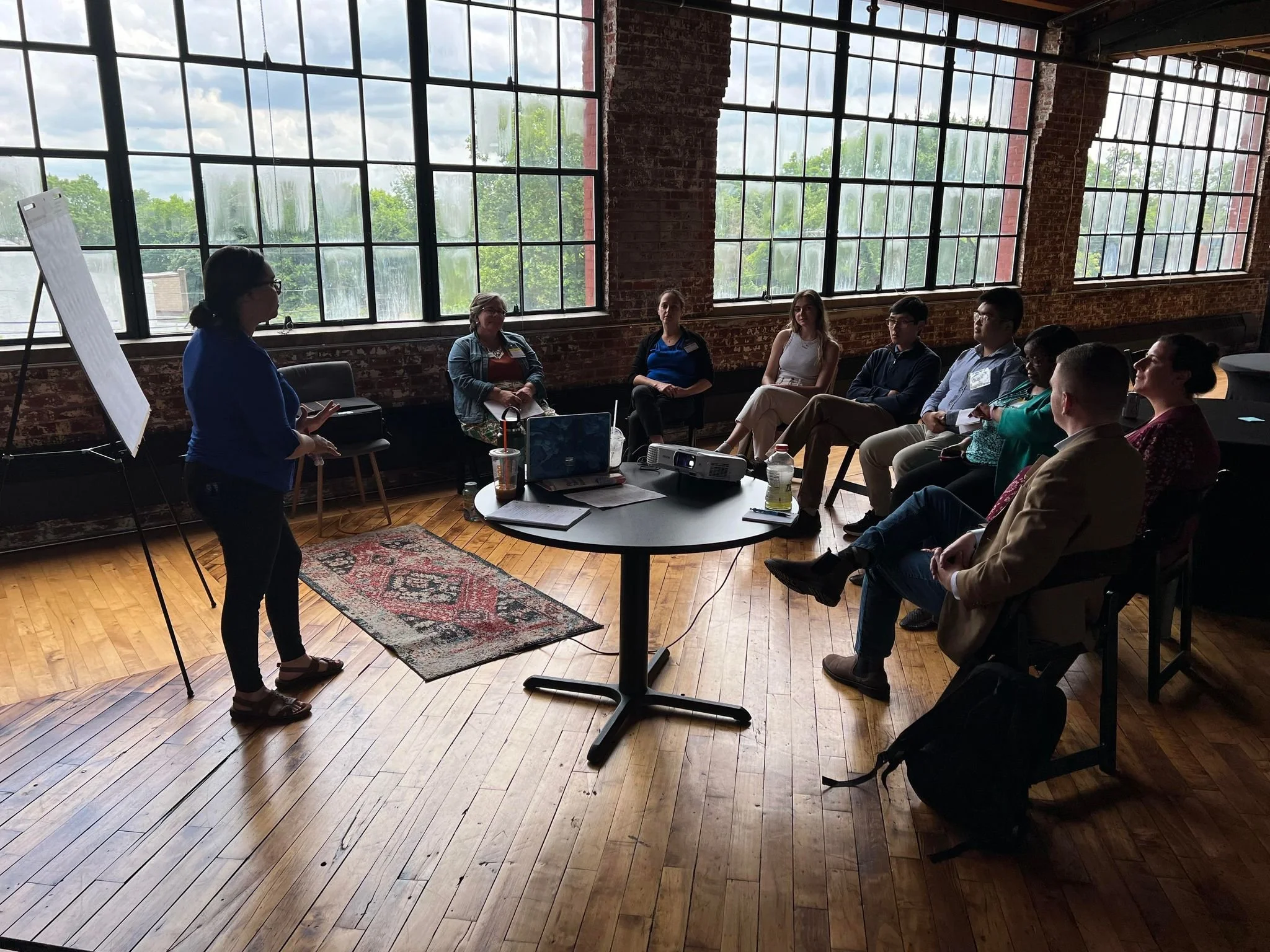On Wednesday, June 5th ― the Coalition for the Delaware River Watershed (CDRW) hosted its inaugural Diversity, Equity, Inclusion and Justice (DEIJ) Day of Learning at the Social Profit Center in Hamilton, New Jersey.
The event was constructed by CDRW’s DEIJ Workgroup to highlight regional expertise and equip participants with tools to enhance advocacy, outreach, programming and more.
Our robust agenda featured community-based organizations, state environmental agencies, and civic engagement groups who spoke about addressing systemic and racial injustices, forming authentic and representative partnerships, making nature accessible for individuals with disabilities, among other critical DEIJ topics.
Sharonda Allen, MPA addresses the DEIJ Day of Learning attendees during the opening plenary
We kicked the day off with Sharonda Allen, MPA, who is an Author, Historian, Climate Activist, Social Philanthropist, New Jersey Equitable Energy Coalition (NJPEEC) Steering Committee Member, Tri-County Sustainability Environmental Justice Co-Chair, Greater NJ Gateway Climate Reality Project Chapter Co-Chair, and Founder and Executive Director of East Orange, NJ based nonprofit organization Operation Grow, Inc.
A trained Climate Reality Leader, Ms. Allen also serves as a trainer for the NJ Council for Economic Education, a Service Learning Facilitator, an Amistad Fellow, the Region 1 Membership Coordinator for ASALH, an NJ Audubon Teacher of Ecology, and a Rutgers Environmental Steward & Green Infrastructure Champion.
Sharonda spoke to attendees about the Cost & Benefits of Diversity, Equity, Inclusion & Justice (DEIJ). Click the button below to check out her presentation slides!
Kandyce Perry Addresses DEIJ Day of Learning attendees during lunch
We were also pleased to feature Kandyce Perry ― Director of Environmental Justice at the New Jersey Department of Environmental Protection ― who provided remarks on how the Garden State is enacting regulations and processes to include and protect vulnerable populations from further harm. Check our Click the button below to check out Kandyce’s presentation slides!
The day featured four learning sessions
Empowerment through Community Advocacy, By Priscilla (Pri) Oliveira, The Watershed Institute
Pri Oliveira addressing the attendees of the Empowerment through Community Advocacy learning session
Disempowered communities often feel as if nothing they say or do will result in positive, lasting changes. Who can blame them? Not only have they been systemically marginalized but engaging with environmental policies and processes can often be confusing as well as intimidating (even for experts!). Sharing practical knowledge and support through accessible advocacy education is one way to address the many barriers to civic participation. By understanding how processes work and how one can advocate within those existing rules, empowered community members can significantly amplify the impact and collective voice behind environmental initiatives. These programs can also inspire activism; with an understanding of how existing decision-making processes in environmental policy work, community members can strategically challenge discriminatory aspects of environmental policy.
Designing a High Quality Career Pathway, By Daniel Lawson, PowerCorpsPHL; Jillian Lopez, PowerCorpsPHL; Seth Degginger, PowerCorpsPHL
Daniel Lawson, Jillian Lopez, Seth Degginger exchange information with the group during the Designing a High Quality Career Pathway learning session
This program will engage participants in environmental service while preparing participants to transition into high quality employment up on program completion. In the small groups, attendees will work together to design the program and how participants will be guided from service to job placement. In this activity, attendees will have to consider realities like barrier program participants have (ex: transportation, childcare, and court involvement), occupations, employers, trainings needed and training partners, projected career growth, resources needed, and partners/stakeholders.
Nature: Access for All, Sean Kane-Holland, Pinelands Preservation Alliance
Sean Kane-Holland and group engage in discussion during the Nature: Access for All learning session
The Pinelands is for Everyone initiative works to help overcome the physical as well as regulatory barriers faced by people with disabilities when visiting natural areas in the Pinelands Region of New Jersey. This has recently morphed into a statewide initiative Nature: Access for All. By allying with individuals with disabilities, organizations dedicated to those with disabilities, and public and private landowning agencies we aim to help overcome barriers seen and unseen; and to show the world that everyone can enjoy the joys of nature throughout New Jersey.
Building Community through Wildflower Farm: Tomia MacQueen, Wildflower Farm
Tomia MacQueen presenting to attendees during her Building Community through Wildflower Farm learning session
Wildflower Farm hosts educational workshops on Self (and Community) Sustainability through workshops for adults and children. The farm sustainably produces organically and ethically raised, pastured and truly free-range poultry, lamb, and culturally relevant vegetables and seeds with a truly unique focus on humane animal husbandry policies and conservation practices.
Tomia partners with local organizations and schools as a featured Farmer/Mentor within youth and young adult programs such as the Outdoor Equity Alliance Agrihood Program and the Princeton University Seed Farm and others.
In addition, four affinity groups were held to create space for shared identities.
Black, Indigenous, People of Color (BIPOC)
Lesbian, Gay, Bisexual, Transgender, Queer/Questioning, Intersex and Asexual. (LGBTQIA+)
Emerging Professionals
Aspiring Allies/Dominant Culture
We’re continually grateful for our partner organization's time and commitment towards implementing this necessary work.
Visit our website to preview session descriptions and speaker bios: https://www.delriverwatershed.org/deij-day-of-learning-2024







